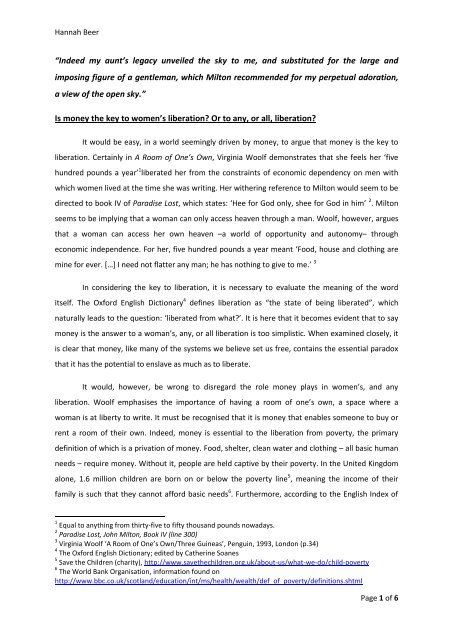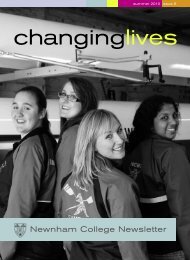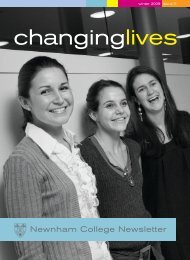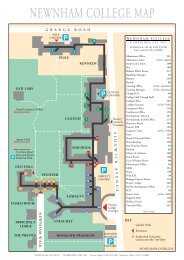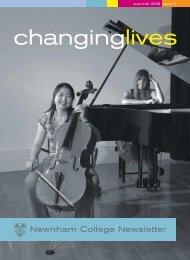“Indeed my aunt's legacy unveiled the sky to me, and substituted for ...
“Indeed my aunt's legacy unveiled the sky to me, and substituted for ...
“Indeed my aunt's legacy unveiled the sky to me, and substituted for ...
You also want an ePaper? Increase the reach of your titles
YUMPU automatically turns print PDFs into web optimized ePapers that Google loves.
Hannah Beer<br />
<strong>“Indeed</strong> <strong>my</strong> aunt’s <strong>legacy</strong> <strong>unveiled</strong> <strong>the</strong> <strong>sky</strong> <strong>to</strong> <strong>me</strong>, <strong>and</strong> <strong>substituted</strong> <strong>for</strong> <strong>the</strong> large <strong>and</strong><br />
imposing figure of a gentleman, which Mil<strong>to</strong>n recom<strong>me</strong>nded <strong>for</strong> <strong>my</strong> perpetual adoration,<br />
a view of <strong>the</strong> open <strong>sky</strong>.”<br />
Is money <strong>the</strong> key <strong>to</strong> wo<strong>me</strong>n’s liberation? Or <strong>to</strong> any, or all, liberation?<br />
It would be easy, in a world seemingly driven by money, <strong>to</strong> argue that money is <strong>the</strong> key <strong>to</strong><br />
liberation. Certainly in A Room of One’s Own, Virginia Woolf demonstrates that she feels her ‘five<br />
hundred pounds a year’ 1 liberated her from <strong>the</strong> constraints of economic dependency on <strong>me</strong>n with<br />
which wo<strong>me</strong>n lived at <strong>the</strong> ti<strong>me</strong> she was writing. Her wi<strong>the</strong>ring reference <strong>to</strong> Mil<strong>to</strong>n would seem <strong>to</strong> be<br />
directed <strong>to</strong> book IV of Paradise Lost, which states: ‘Hee <strong>for</strong> God only, shee <strong>for</strong> God in him’ 2 . Mil<strong>to</strong>n<br />
seems <strong>to</strong> be implying that a woman can only access heaven through a man. Woolf, however, argues<br />
that a woman can access her own heaven –a world of opportunity <strong>and</strong> au<strong>to</strong>no<strong>my</strong>– through<br />
economic independence. For her, five hundred pounds a year <strong>me</strong>ant ‘Food, house <strong>and</strong> clothing are<br />
mine <strong>for</strong> ever. […] I need not flatter any man; he has nothing <strong>to</strong> give <strong>to</strong> <strong>me</strong>.’ 3<br />
In considering <strong>the</strong> key <strong>to</strong> liberation, it is necessary <strong>to</strong> evaluate <strong>the</strong> <strong>me</strong>aning of <strong>the</strong> word<br />
itself. The Ox<strong>for</strong>d English Dictionary 4 defines liberation as “<strong>the</strong> state of being liberated”, which<br />
naturally leads <strong>to</strong> <strong>the</strong> question: ‘liberated from what?’. It is here that it beco<strong>me</strong>s evident that <strong>to</strong> say<br />
money is <strong>the</strong> answer <strong>to</strong> a woman’s, any, or all liberation is <strong>to</strong>o simplistic. When examined closely, it<br />
is clear that money, like many of <strong>the</strong> systems we believe set us free, contains <strong>the</strong> essential paradox<br />
that it has <strong>the</strong> potential <strong>to</strong> enslave as much as <strong>to</strong> liberate.<br />
It would, however, be wrong <strong>to</strong> disregard <strong>the</strong> role money plays in wo<strong>me</strong>n’s, <strong>and</strong> any<br />
liberation. Woolf emphasises <strong>the</strong> importance of having a room of one’s own, a space where a<br />
woman is at liberty <strong>to</strong> write. It must be recognised that it is money that enables so<strong>me</strong>one <strong>to</strong> buy or<br />
rent a room of <strong>the</strong>ir own. Indeed, money is essential <strong>to</strong> <strong>the</strong> liberation from poverty, <strong>the</strong> primary<br />
definition of which is a privation of money. Food, shelter, clean water <strong>and</strong> clothing – all basic human<br />
needs – require money. Without it, people are held captive by <strong>the</strong>ir poverty. In <strong>the</strong> United Kingdom<br />
alone, 1.6 million children are born on or below <strong>the</strong> poverty line 5 , <strong>me</strong>aning <strong>the</strong> inco<strong>me</strong> of <strong>the</strong>ir<br />
family is such that <strong>the</strong>y cannot af<strong>for</strong>d basic needs 6 . Fur<strong>the</strong>rmore, according <strong>to</strong> <strong>the</strong> English Index of<br />
1<br />
Equal <strong>to</strong> anything from thirty-five <strong>to</strong> fifty thous<strong>and</strong> pounds nowadays.<br />
2<br />
Paradise Lost, John Mil<strong>to</strong>n, Book IV (line 300)<br />
3<br />
Virginia Woolf ‘A Room of One’s Own/Three Guineas’, Penguin, 1993, London (p.34)<br />
4<br />
The Ox<strong>for</strong>d English Dictionary; edited by Ca<strong>the</strong>rine Soanes<br />
5<br />
Save <strong>the</strong> Children (charity), http://www.save<strong>the</strong>children.org.uk/about-us/what-we-do/child-poverty<br />
6<br />
The World Bank Organisation, in<strong>for</strong>mation found on<br />
http://www.bbc.co.uk/scotl<strong>and</strong>/education/int/ms/health/wealth/def_of_poverty/definitions.shtml<br />
Page 1 of 6
Hannah Beer<br />
Multiple Deprivation, ‘88 per cent of <strong>the</strong> [areas] that are <strong>the</strong> most deprived in 2010 were also<br />
amongst <strong>the</strong> most deprived in 2007’. More than half of <strong>the</strong> population of <strong>my</strong> ho<strong>me</strong> city, Liverpool,<br />
lives in poverty 7 , a statistic which has hardly changed since 1851, when "Liverpool was <strong>to</strong>p of <strong>the</strong> list<br />
of every index of deprivation" 8 . It is clear, <strong>the</strong>re<strong>for</strong>e, that many of <strong>the</strong> children born in<strong>to</strong> poverty will<br />
live <strong>the</strong>ir whole lives in poverty, <strong>and</strong>, in turn, bear children in<strong>to</strong> poverty. Clearly, <strong>the</strong> liberation from<br />
poverty is a long process, <strong>to</strong> which money is undoubtedly crucial.<br />
Yet, in spite of money’s obvious power <strong>to</strong> liberate, it cannot be ignored that in itself, money<br />
has <strong>the</strong> potential <strong>to</strong> enslave. For example, sex trafficking is reputed <strong>to</strong> be a multibillion dollar,<br />
international criminal industry 9 <strong>and</strong> yet is <strong>the</strong> anti<strong>the</strong>sis of female liberation: according <strong>to</strong> <strong>the</strong> United<br />
Nations, <strong>the</strong>re are an estimated 2.5 million cases of human trafficking at any one ti<strong>me</strong>, <strong>and</strong> 79 per<br />
cent of <strong>the</strong>se are acts of sexual exploitation of wo<strong>me</strong>n <strong>and</strong> children 10 . Virginia Woolf illustrates that<br />
<strong>the</strong> money she received from her aunt allowed her liberation of <strong>the</strong> mind; but money buys drugs,<br />
supplies drugs <strong>and</strong> feeds drug addiction. Dependence is <strong>the</strong> exact thing Woolf said money liberates<br />
one from, but substance addiction is <strong>the</strong> most obvious <strong>for</strong>m of dependence, <strong>and</strong> it is only fed by<br />
money. The National Lottery is also an interesting paradox, in that winning is promoted as <strong>the</strong><br />
ultimate financial liberation (“It could be you!” was <strong>the</strong> slogan that launched <strong>the</strong> National Lottery),<br />
<strong>and</strong> yet people can beco<strong>me</strong> enslaved <strong>to</strong> it. The odds of winning <strong>the</strong> main draw are as low as one in<br />
13 million 11 . None<strong>the</strong>less, people pay <strong>to</strong> play, many using <strong>the</strong> sa<strong>me</strong> numbers each week, <strong>for</strong> fear<br />
that <strong>the</strong> week <strong>the</strong>y don’t play, ‘<strong>the</strong>ir’ numbers co<strong>me</strong> up <strong>and</strong> <strong>the</strong>y will have missed <strong>the</strong>ir chance <strong>to</strong> be<br />
‘liberated’. Liberation is not <strong>the</strong> purpose of money; it is <strong>me</strong>rely a by-product of it, as is enslave<strong>me</strong>nt.<br />
It is evident even in A Room of One’s Own that money does not appear from nowhere: <strong>the</strong><br />
money that ‘<strong>unveiled</strong> <strong>the</strong> <strong>sky</strong>’ <strong>to</strong> Woolf ca<strong>me</strong> from her aunt. The realisation that money must always<br />
co<strong>me</strong> from so<strong>me</strong>where, <strong>and</strong> is dependent upon a chain of supply, highlights <strong>the</strong> fact that it cannot<br />
<strong>the</strong> sole key <strong>to</strong> liberation. When considering material liberation from poverty, it is apparent that<br />
<strong>the</strong>re must be a legitimate system in place <strong>to</strong> provide <strong>the</strong> money <strong>to</strong> liberate, be it an inheritance, as<br />
in Woolf’s case, work, charity, a bank loan or <strong>the</strong> welfare state. This basic concept of a system <strong>to</strong><br />
provide liberation can be extended fur<strong>the</strong>r. Systems of democracy can liberate entire nations from<br />
political oppression, health care systems can provide <strong>the</strong> <strong>me</strong>dicine that liberates people from illness,<br />
<strong>and</strong> it is systems of justice that liberate people from wrongful incarceration, oppression or<br />
7 The English Index of Multiple Deprivation, statistics by Mukund Lad, issued 24 th March 2011<br />
(http://www.communities.gov.uk/docu<strong>me</strong>nts/statistics/pdf/1871208.pdf)<br />
8 Professor Frank Neal, in<strong>for</strong>mation found on<br />
http://www.bbc.co.uk/liverpool/content/articles/2009/06/18/his<strong>to</strong>ry_sectarian_1909_feature.shtml<br />
9 Equality Now (charity), http://www.equalitynow.org/our-work/trafficking<br />
10 The United Nations Website, http://www.unodc.org/unodc/en/human-trafficking/faqs.html<br />
11 Ca<strong>me</strong>lot, organisers of <strong>the</strong> UK nation Lottery (http://ca<strong>me</strong>lotgroup.co.uk)<br />
Page 2 of 6
Hannah Beer<br />
persecution. It now seems incredible that until 1991 marital rape was not a criminal offence in<br />
Engl<strong>and</strong> 12 , <strong>me</strong>aning that a woman did not have <strong>the</strong> liberty <strong>to</strong> say no <strong>to</strong> her husb<strong>and</strong>; it was a system<br />
of justice that had previously defended only <strong>the</strong> rights of <strong>me</strong>n which <strong>the</strong>n granted wo<strong>me</strong>n this<br />
liberation.<br />
Religions are systems that aim <strong>for</strong> spiritual liberation. Christians believe that Jesus himself<br />
freed <strong>the</strong> world from sin: ‘It is <strong>for</strong> freedom that Christ has set us free. St<strong>and</strong> firm, <strong>the</strong>n, <strong>and</strong> do not<br />
let yourselves be burdened again by a yoke of slavery.’ (Galatians, 5:1) 13 . The <strong>the</strong><strong>me</strong> of liberation is a<br />
constant one in both <strong>the</strong> Old <strong>and</strong> New Testa<strong>me</strong>nts, <strong>and</strong> <strong>the</strong> book of Exodus tells <strong>the</strong> s<strong>to</strong>ry of <strong>the</strong><br />
liberation of <strong>the</strong> Israelites through Moses. Buddhism provides a systematic way of life <strong>to</strong> lead <strong>to</strong> <strong>the</strong><br />
liberation from dukkha (suffering). With regards <strong>to</strong> wo<strong>me</strong>n’s liberation, Islam’s basic principles aim<br />
<strong>to</strong> liberate wo<strong>me</strong>n; <strong>the</strong> Hijab is intended <strong>to</strong> liberate wo<strong>me</strong>n from being objectified by <strong>me</strong>n. Religion<br />
<strong>and</strong> politics however are just as equivocal in <strong>the</strong> issue of liberation as money is. The Nazi move<strong>me</strong>nt<br />
in Germany was a political system that clai<strong>me</strong>d <strong>to</strong> strive <strong>for</strong> liberation from poverty <strong>and</strong> was brought<br />
about by democracy. It actually created a state of fear, oppression <strong>and</strong> captivity, a paradox<br />
epi<strong>to</strong>mised in <strong>the</strong> desperately cynical words written on <strong>the</strong> gateways of <strong>the</strong> Nazi concentration<br />
camps, “Arbeit macht Frei” (work makes you free). In <strong>the</strong> modern day, citizens of North Korea are<br />
literally held captive by <strong>the</strong>ir communist regi<strong>me</strong> 14 , when <strong>the</strong> aim of communism is supposedly <strong>to</strong><br />
protect <strong>the</strong> liberties of <strong>the</strong> individual. Religious systems <strong>to</strong>o are not exempt from this paradox<br />
particularly in relation <strong>to</strong> <strong>the</strong> liberation of wo<strong>me</strong>n. Under Taliban rule, Afghan wo<strong>me</strong>n are not<br />
allowed <strong>to</strong> be educated, partake in politics or even leave <strong>the</strong> house without a male blood-relative 15 .<br />
The Catholic Church still prohibits wo<strong>me</strong>n from being priests, which would seem <strong>to</strong> epi<strong>to</strong>mise <strong>the</strong><br />
ideas of Mil<strong>to</strong>n that Virginia Woolf scornfully dismissed.<br />
In A Room of One’s Own, Woolf emphasises <strong>the</strong> restrictions children place on a woman’s<br />
intellectual <strong>and</strong> economic au<strong>to</strong>no<strong>my</strong>: ‘First <strong>the</strong>re are nine months be<strong>for</strong>e <strong>the</strong> baby is born. Then <strong>the</strong><br />
baby is born. Then <strong>the</strong>re are three or four months spent in feeding <strong>the</strong> baby. After <strong>the</strong> baby is fed<br />
<strong>the</strong>re are certainly five years spent in playing with <strong>the</strong> baby.’ (p20). With <strong>the</strong> availability of <strong>the</strong> Pill<br />
<strong>and</strong> o<strong>the</strong>r <strong>for</strong>ms of contraception however, a woman is freed from <strong>the</strong> constraints of her fertility as<br />
she is able, <strong>and</strong> crucially, encouraged, <strong>to</strong> control it in a way Woolf was not. These changed cultural<br />
attitudes <strong>to</strong> fertility <strong>and</strong> sex have resulted in wo<strong>me</strong>n being liberated <strong>to</strong> choose how <strong>to</strong> manage <strong>the</strong>ir<br />
reproductive years. It is no longer abnormal <strong>for</strong> a woman not <strong>to</strong> have children, just as it now<br />
12 Rape Crisis (charity), http://www.rapecrisis.org.uk/maritalrape2.php<br />
13 New International Version, The Holy Bible<br />
14 “In labour camps, […] The Democratic People’s Republic of Korea detains an estimated 150,000-200,000<br />
political prisoners. The regi<strong>me</strong> claims <strong>to</strong> hold precisely none.” – article in The Economist, 21 st April 2012<br />
15 Amnesty International (charity), http://www.amnesty.org.uk/uploads/docu<strong>me</strong>nts/doc_22198.pdf<br />
Page 3 of 6
Hannah Beer<br />
accepted <strong>for</strong> a woman <strong>to</strong> raise a child on her own. The popularisation of childcare <strong>me</strong>ans that<br />
wo<strong>me</strong>n are now at liberty <strong>to</strong> choose both having children <strong>and</strong> going <strong>to</strong> work, which Woolf clearly<br />
thought impossible. It is ironic, however, that just as cultural attitudes have liberated wo<strong>me</strong>n in this<br />
sense, <strong>the</strong>y imprison wo<strong>me</strong>n in ano<strong>the</strong>r. The advent of <strong>the</strong> ‘celebrity’ has brought about a culture of<br />
obsession with <strong>the</strong> way wo<strong>me</strong>n look. One in every two hundred wo<strong>me</strong>n suffers from anorexia<br />
nervosa in <strong>the</strong> UK (compared with one in every two thous<strong>and</strong> <strong>me</strong>n) 16 , <strong>and</strong> research has shown that<br />
<strong>the</strong> <strong>me</strong>dia has a critical role in <strong>the</strong> develop<strong>me</strong>nt of eating disorders. 17 This is hardly surprising when<br />
one considers that wo<strong>me</strong>n are bombarded daily with articles on <strong>the</strong> weight – whe<strong>the</strong>r overweight or<br />
underweight – of female celebrities. Anorexia is an enslave<strong>me</strong>nt of <strong>the</strong> mind <strong>and</strong> body: <strong>the</strong> mind of<br />
an anorexic is held captive by <strong>the</strong> desire <strong>to</strong> lose weight; <strong>and</strong> <strong>the</strong> body is in turn under <strong>the</strong> complete<br />
rule of <strong>the</strong> mind.<br />
Fur<strong>the</strong>rmore, <strong>the</strong> more liberal attitudes <strong>to</strong> sex have resulted in an increased availability of<br />
pornography. Anecdotally, it is increasingly accepted that <strong>the</strong> primary source of sex education <strong>for</strong><br />
many teenage boys is pornography. Thus, <strong>the</strong>ir sexual expectations of wo<strong>me</strong>n are not that <strong>the</strong>y are<br />
empowered, or equal <strong>to</strong> <strong>me</strong>n, but instead are sexually available <strong>and</strong> compliant; this expectation<br />
must necessarily influence girls in turn. As Caitlin Moran says in How <strong>to</strong> Be a Woman 18 , <strong>the</strong><br />
pornography industry shows sex <strong>to</strong> be ‘a thing that just happens <strong>to</strong> a woman’. Woolf’s idea of a<br />
‘large <strong>and</strong> imposing figure of a gentleman’ is especially relevant here. In portraying wo<strong>me</strong>n in this<br />
way, <strong>the</strong> <strong>me</strong>dia <strong>and</strong> <strong>the</strong> pornography industry have taken what should be a woman’s definitive<br />
‘room of her own’, i.e. her body, <strong>and</strong> made it ei<strong>the</strong>r public, or, in <strong>the</strong> case of pornography, <strong>the</strong><br />
property of <strong>me</strong>n. Both of <strong>the</strong>se are <strong>the</strong> anti<strong>the</strong>sis of wo<strong>me</strong>n’s liberation.<br />
Whilst money, political <strong>and</strong> religious systems <strong>and</strong> cultural attitudes are all important fac<strong>to</strong>rs<br />
in wo<strong>me</strong>n’s, any, or indeed all liberation, <strong>the</strong>ir inherent paradox <strong>me</strong>ans that <strong>the</strong>y can only be part of<br />
<strong>the</strong> solution. In A Room of One’s Own, Virginia Woolf considers that ‘it would have been impossible,<br />
completely <strong>and</strong> entirely, <strong>for</strong> any woman <strong>to</strong> have written <strong>the</strong> plays of Shakespeare in <strong>the</strong> age of<br />
Shakespeare’ (p.42) because wo<strong>me</strong>n were not sent <strong>to</strong> school <strong>and</strong> educated in <strong>the</strong> sa<strong>me</strong> way which<br />
<strong>me</strong>n were. Although she maintains throughout A Room of One’s Own that money is crucial <strong>to</strong> <strong>the</strong><br />
liberation of wo<strong>me</strong>n, it cannot be overlooked that had Woolf herself not been educated, she would<br />
never have been able <strong>to</strong> write with <strong>the</strong> fluency <strong>and</strong> impact that she did. She would not have been<br />
16<br />
http://www.nhs.uk/Conditions/Anorexia-nervosa/Pages/Causes.aspx, figure from 2010.<br />
17<br />
Research led by <strong>the</strong> Royal College of Psychiatrists, in<strong>for</strong>mation found on<br />
http://news.bbc.co.uk/1/hi/8528443.stm<br />
18<br />
‘How To Be A Woman’, Caitlin Moran; Ebury Press (R<strong>and</strong>om House), St Ives; 2011.<br />
Page 4 of 6
Hannah Beer<br />
invited <strong>to</strong> lecture at Newnham College about wo<strong>me</strong>n <strong>and</strong> fiction, had she not been educated as she<br />
was.<br />
Woolf was lucky in that she had <strong>the</strong> money <strong>to</strong> provide a room of her own, but her education<br />
allowed her <strong>the</strong> ultimate room of her own: her mind. It is education which is <strong>the</strong> true solution <strong>to</strong><br />
liberation: <strong>the</strong>re is no paradox <strong>to</strong> it. It cannot enslave or inhibit, as money, systems or cultural<br />
attitudes can; education – not dogma or propag<strong>and</strong>a – only enriches <strong>and</strong> liberates <strong>the</strong> mind. With<br />
<strong>the</strong> liberation of <strong>the</strong> mind co<strong>me</strong>s <strong>the</strong> ‘unveiling of <strong>the</strong> <strong>sky</strong>’ that Woolf aligns with money. Whilst<br />
money may well have ‘<strong>unveiled</strong> <strong>the</strong> <strong>sky</strong>’ <strong>to</strong> Woolf, it would have appeared a lot more daunting had<br />
her mind not been educated enough <strong>to</strong> appreciate its vastness. Education is <strong>the</strong> enabler of not just<br />
wo<strong>me</strong>n’s, but of any, or all liberation, because it leads <strong>to</strong> degrees of, or absolute independence. For<br />
example, had <strong>the</strong> Vic<strong>to</strong>rians not started educating girls, it is likely that wo<strong>me</strong>n would not have got<br />
<strong>the</strong> vote, been able <strong>to</strong> go <strong>to</strong> university or been granted equal pay – education was <strong>the</strong> first step in<br />
wo<strong>me</strong>n’s emancipation.<br />
In addition, education provides liberation from poverty. It is self-evident that education<br />
makes you more employable, which leads <strong>to</strong> an inco<strong>me</strong>. The Financial Ti<strong>me</strong>s recently published an<br />
edited extract from ‘Poor Economics’ 19 , a book that examines what can be done <strong>to</strong> eradicate<br />
poverty. It says that, most commonly, <strong>the</strong> poor ‘lack critical pieces of in<strong>for</strong>mation <strong>and</strong> believe things<br />
that are not true’. For example, <strong>the</strong>y do not know <strong>the</strong> benefits of immunising children, nor do <strong>the</strong>y<br />
know <strong>the</strong> best way <strong>to</strong> avoid contracting HIV. Education is not just crucial <strong>to</strong> <strong>the</strong> econo<strong>my</strong>, but is a<br />
critical partner in <strong>the</strong> health system as well: an educated mo<strong>the</strong>r is more likely <strong>to</strong> have a smaller<br />
family, <strong>and</strong> immunise <strong>and</strong> educate <strong>the</strong> children she does have. Education benefits <strong>the</strong> health<br />
systems not just of developing countries but of <strong>the</strong> richer countries of <strong>the</strong> West, by in<strong>for</strong>ming people<br />
about disease prevention <strong>and</strong> early detection. Fur<strong>the</strong>rmore, an educated child beco<strong>me</strong>s an<br />
employable adult; an employable adult is an economically active adult with choices <strong>and</strong><br />
independence; an educated mind is a lifelong source of solace, inco<strong>me</strong> <strong>and</strong> flexibility.<br />
In considering what <strong>the</strong> key <strong>to</strong> liberation is, it has beco<strong>me</strong> evident that <strong>the</strong> apparently<br />
obvious solutions – money, stable political <strong>and</strong> religious systems, <strong>and</strong> enlightened cultural attitudes<br />
– are actually inherently complex <strong>and</strong> contradic<strong>to</strong>ry: though <strong>the</strong>y can liberate, <strong>the</strong>y can also enslave.<br />
The definitive resolution <strong>to</strong> liberation is education: it enhances good systems <strong>and</strong> challenges <strong>the</strong><br />
bad. Virginia Woolf argued that it was her aunt’s <strong>legacy</strong> that ‘<strong>unveiled</strong> <strong>the</strong> <strong>sky</strong>’ <strong>to</strong> her, but it was her<br />
education that <strong>me</strong>ant she knew <strong>the</strong> <strong>sky</strong> was being <strong>unveiled</strong>, <strong>and</strong> it is our education that frees us<br />
19 ‘Poor Economics: Barefoot Hedge fund Managers, DIY Doc<strong>to</strong>rs <strong>and</strong> <strong>the</strong> Surprising Truth about Life on Less<br />
than $1 a Day’, Abhijit Banerjee <strong>and</strong> Es<strong>the</strong>r Duflo, Penguin, March 2012<br />
Page 5 of 6
Hannah Beer<br />
from <strong>the</strong> need <strong>for</strong> <strong>legacy</strong>. Education liberates <strong>the</strong> mind from ignorance, nations from poverty <strong>and</strong><br />
wo<strong>me</strong>n from inferiority. Education leads people <strong>to</strong> <strong>the</strong> au<strong>to</strong>no<strong>my</strong> that is needed <strong>for</strong> any kind of<br />
room of <strong>the</strong>ir own, be it literal or figurative. It is <strong>the</strong> ultimate key <strong>to</strong> liberation because it contains no<br />
paradox; it is an unequivocal <strong>for</strong>ce <strong>for</strong> good.<br />
Word count: 2,324 (excluding quotes)<br />
Page 6 of 6


